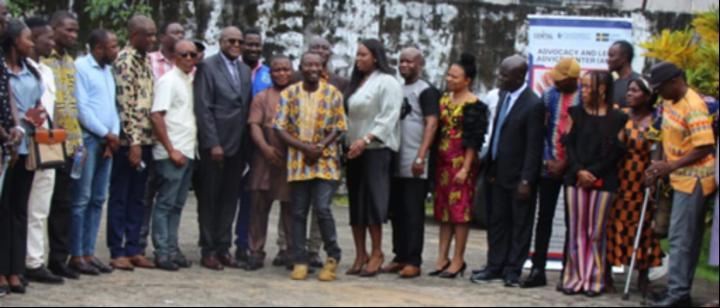Africa-Press – Liberia. In a bid to bolster transparency, accountability, and adherence to Liberia’s Freedom of Information (FOI) law, the Independent Information Commission (IIC), in partnership with the Center for Transparency and Accountability in Liberia (CENTAL), has hosted a training workshop for departmental and sectional heads from the Internal Audit Agency (IAA), National Bureau of Concession (NBC), and National Commission on Disabilities (NCD).
Speaking at the closing ceremony on Thursday, October 9, 2025, in Congo Town, IIC Executive Director, Madam Lorpu Page, emphasized that the awareness of the FOI Act is critical for every Ministry, Agency, Commission, Department, and Corporation because leadership at their level determines whether compliance becomes an institutional culture or remains just a legal obligation.
She elaborated that compliance goes beyond simply responding to requests, saying that it requires proactive disclosure of information, proper record keeping, an efficient information management system, and above all, the willingness to engage the public in an open and transparent manner.
“When we integrate compliance in our work, we promote efficiency; reduce secrecy and impunity, enabling citizens to make informed contributions to national development,” she noted.
On the topic of integrity, she added they must also focus on integrity building as departmental and sectoral heads. She emphasized that such institutions are the custodian of public trust and the values they uphold and the standards they set clearly shape the ethical climate of their department.
The IIC boss warned that corruption remains one of the greatest obstacles to national progress, undermining public confidence, distorting resource allocation, and weakening institutional effectiveness. For this reason, according to her, the fight against corruption and commitment to integrity must remain strong.
Madam Page reminded participants that this training was meant to arm them with practical tools and understanding to make FOI compliance and anti-corruption work part of everyday public service:
“Let us approach this training not as a mere requirement but as an opportunity to reaffirm our commitment to openness, accountability, and good governance, and strive to work with our institution heads to put into place the Freedom of Information standard in our various institutions that will ensure compliance with the FOI Law”, she further emphasized.
For his part, CENTAL Executive Director Anderson Maimen stressed that access to information is essential for building a culture of accountability.
“Proactive disclosure of information is important. You don’t have to wait for people to knock on your door before sharing information. Every time you allow people to speculate is usually against the information.”
Referring to the contentious Presidential Villas project in Lofa County, he said,
“For example, there has been public outcry about the project that is allegedly being constructed, which is termed as Presidential Valla. We take that name because the government has not provided the public with clear information on the project’s details, funding source, and other information necessary for the public to make an informed decision. Nobody knows why the government is withholding valuable information about that project. Being open, being transparent, and being proactive in giving information helps to project you positively to those that you serve.”
IAA Director General David Kemah highlighted the role of information in accountability. According to him, disseminating information to citizens requires access to information. It gives the public the ability to be able to hold their government accountable. Transparency and integrity in government rely on information. For transparency in government, people need to know what is going on”, he told the gathering.
Meanwhile, LEITI Head of Secretariat, Jeffrey N. Yates, described information provision as a matter of human rights.
“We need to provide the information. Information provision is a human rights issue. Most of the time we have information at our offices, but the way we organized it is where we have the challenge”, he said.
In addition, Yates noted, “Sometimes are doing well at the entity, but because you are not providing the information, disinformation and misinformation will have a place spread. Where there is information provision, something happens; you build public trust between the citizens and the government; if you don’t provide the information, then the citizens will speculate.”
The training brought together over 30 participants from various government entities, including the Liberia Anti-Corruption Commission, General Auditing Commission (GAC), LACC (Internal Audit Agency), and LEITI, among others. Its aim is to strengthen public institutions, deepen transparency, and build trust between the government and citizens.
For More News And Analysis About Liberia Follow Africa-Press






